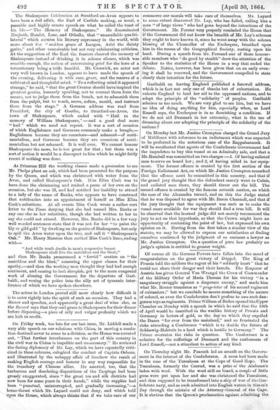The Shakespeare Celebration at Stratford-on-Avon appears to have been a
dull affair, the Earl of Carlisle making, as usual, a passable and highly ornate speech on what he called the toast of his life—" The Memory of Shakespeare." He denominated Macbeth, Hamlet, Lear, and Othello, that "unassailable quadri- lateral" which secures his literary supremacy in the world, with more about the "maiden grace of Imogen, Ariel the dainty sprite," and other conceivable but not very exhilarating criticism. At the suggestion of the Earl the feasters cheered the memory of Shakespeare instead of drinking it in solemn silence, which was sensible enough, the notion of entertaining grief for the hero of a tercentenary being a trifle fanciful. Mr. Creswick, an actor not very well known in London, appears to have made the speech of the evening, delivering it with ease, grace, and the reserve of a cultivated and thoughtful mind. "To a reflecting mind it appeared strange," he said, "that the great Creator should have inspired the greatest genius, humanly speaking, not to counsel them from the senate, not to judge them from the bench, not to admonish them
• from the pulpit, but to teach, move, soften, mould, and instruct them from the stage." A German address was read from Frankfort, the city of Goethe, to Stratford-on-Avon, the town of Shakespeare, which ended with "Hail to the memory of William Shakespeare," —and a good deal more -1' hail" which we need not repent. It was a sort of occasion of which Englishmen and Germans commonly make a bungle,— Englishmen because they are conscious—and ashamed—of senti- mentalism, and Germans because they are conscious of senti- mentalism but not ashamed. It is well over. We cannot honour Shakespeare the more, he is too great for that ; but there was a sort of notion it would be a disrespect to him which he might fairly resent if nothing was done.


































 Previous page
Previous page